Finding investors for your startup can feel overwhelming, but AI tools can make the process faster and simpler. Whether you need to create financial plans, track performance metrics, or connect with the right investors, these tools have you covered. Here's a quick look at seven AI-powered platforms to help you secure funding:
- Lucid Financials: Automates financial planning, tracks key metrics, and offers industry benchmarks for investor-ready materials.
- Crunchbase Pro: Lets you search for investors using filters like industry, location, and investment stage.
- PitchBook: Provides AI-driven insights into investor behavior, market trends, and deal intelligence.
- Foundersuite: Manages investor relationships with an organized CRM and automated updates.
- AngelList: Matches startups with investors based on shared interests and activity patterns.
- Affinity: Centralizes investor interactions by integrating with email, calendars, and CRMs.
- DocSend: Tracks how investors engage with your pitch deck using real-time analytics and secure sharing options.
Quick Comparison
| Tool | Best For | Key Features | Starting Price |
|---|---|---|---|
| Lucid Financials | Financial planning & metrics | AI-generated plans, benchmarks, investor updates | Free tier available |
| Crunchbase Pro | Investor discovery | Search filters, alerts, portfolio analysis | $29/month |
| PitchBook | Market insights | Deal intelligence, custom reports, analytics | Custom pricing |
| Foundersuite | Investor relationship management | CRM, automated updates | Custom pricing |
| AngelList | Matching with investors | Automated matching, data insights | Custom pricing |
| Affinity | Relationship management | Integration with email and calendars | Custom pricing |
| DocSend | Pitch deck engagement | Analytics, access control, smart notifications | Custom pricing |
Start by identifying your startup's needs, then choose tools that fit your stage and goals. Focus on features like financial planning, investor discovery, and relationship management to save time and improve your fundraising efforts.
The Investor’s Playbook: What VCs Look for in AI Startups
1. Lucid Financials
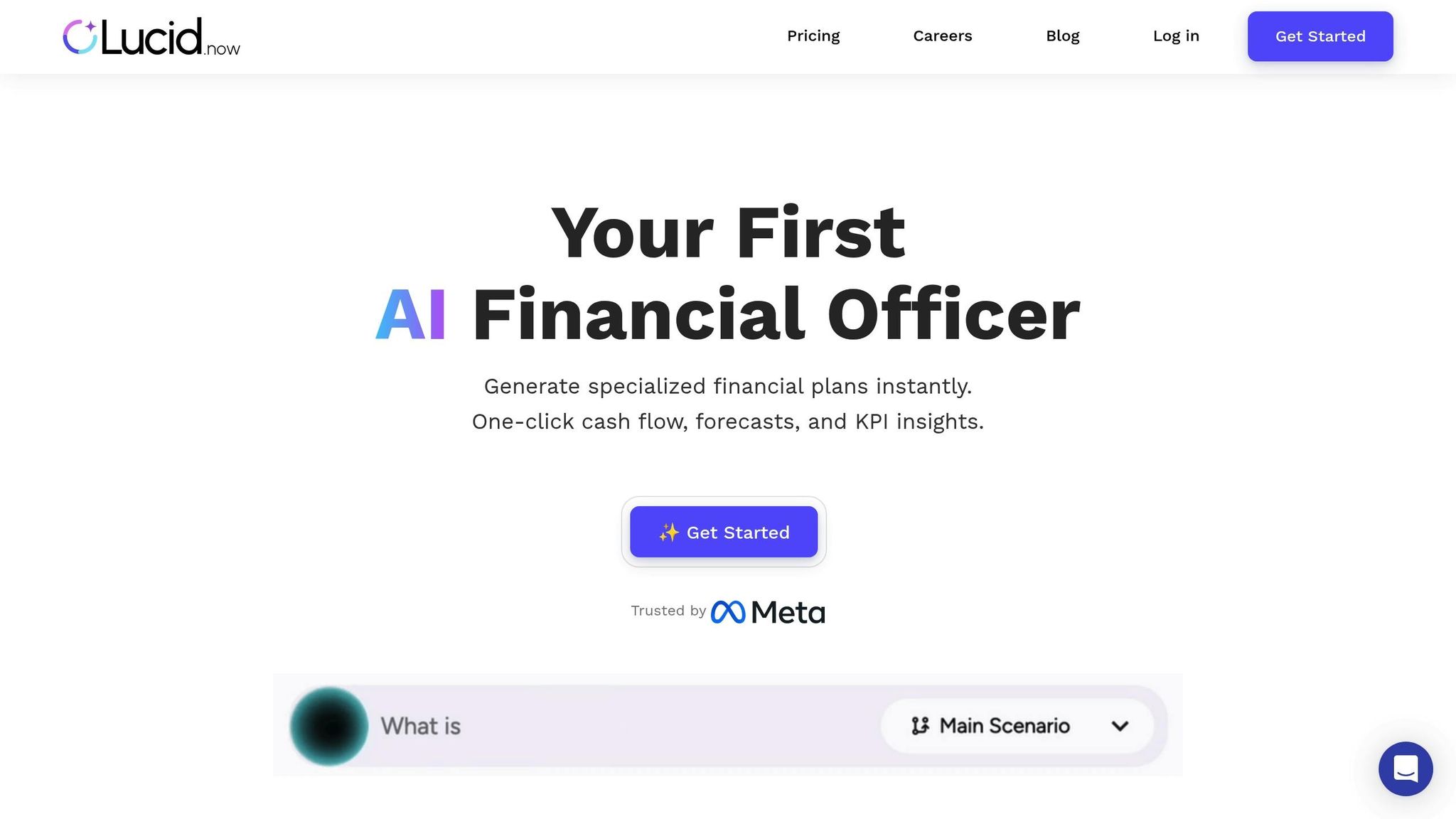
Lucid Financials simplifies investor discovery and fundraising by leveraging AI to analyze your startup's financial data and create tailored fundraising plans.
The platform instantly generates financial plans with multiple scenarios, helping founders showcase their startup's potential. These scenarios include:
- Best-case growth projections
- Worst-case contingency strategies
- Real-time burn rate tracking
- Accurate runway estimates
In addition to dynamic planning tools, Lucid Financials offers detailed industry benchmarks. These benchmarks provide sector-specific metrics like Customer Acquisition Cost (CAC) and valuation multiples, helping founders position their startups effectively during investor pitches.
"Lucid has made it incredibly easy to track spending, plan ahead, and handle our growth. It's straightforward and effective." - Aviv Farhi, Founder and CEO @Showcase
The platform also automates professional investor updates by pulling data from integrated tools like QuickBooks and payroll systems, ensuring accurate and current information.
These real-time insights are invaluable for scaling startups. Luka Mutinda, Founder and CEO @Dukapaq, shared: "As our company grows, budgeting and cash flow management have become crucial. These features are essential and streamline our budgeting and cash flow management."
| Feature | How It Helps Fundraising |
|---|---|
| AI-Generated Financial Plans | Delivers professional, investor-ready projections |
| Real-Time Metrics | Tracks critical performance indicators |
| Industry Benchmarks | Offers competitive data for valuation discussions |
| Automated Investor Updates | Ensures consistent communication with investors |
Lucid Financials offers flexible pricing options, from a free tier for early-stage startups to enterprise-level solutions for scaling businesses. These options ensure all founders have access to the tools they need to attract investors.
2. Crunchbase Pro
Crunchbase Pro offers powerful search tools that help startups connect with investors through a comprehensive database of venture capital firms, angel investors, and investment trends. These tools simplify the process of finding the right investors, especially when time is critical.
Founders can refine their search using several key filters:
| Search Criteria | Description |
|---|---|
| Investment Stage | Seed, Series A–D, Growth |
| Industry Focus | SaaS, Fintech, Healthcare, and more |
| Geographic Location | Search by city, state, or country |
| Check Size | Typical investment amounts in a set range |
| Recent Activity | Investments made in the past 30, 60, or 90 days |
Crunchbase Pro also provides insights into investor behavior, such as:
- Investment Patterns: Spot trends in funding across different sectors.
- Deal Flow: Keep tabs on recent investments and company exits.
- Portfolio Analysis: Examine current investments to identify potential matches.
- Contact Information: Access detailed investor profiles for outreach.
Custom alerts ensure founders stay updated when target investors make new investments or when companies on their watchlists secure funding. This helps founders time their outreach and stay on top of market developments.
The platform also includes features for organizing investor information, like creating targeted lists, exporting data for offline use, and enabling team collaboration.
Crunchbase Pro starts at $29 per month, with enterprise plans available for larger teams or additional needs.
3. PitchBook
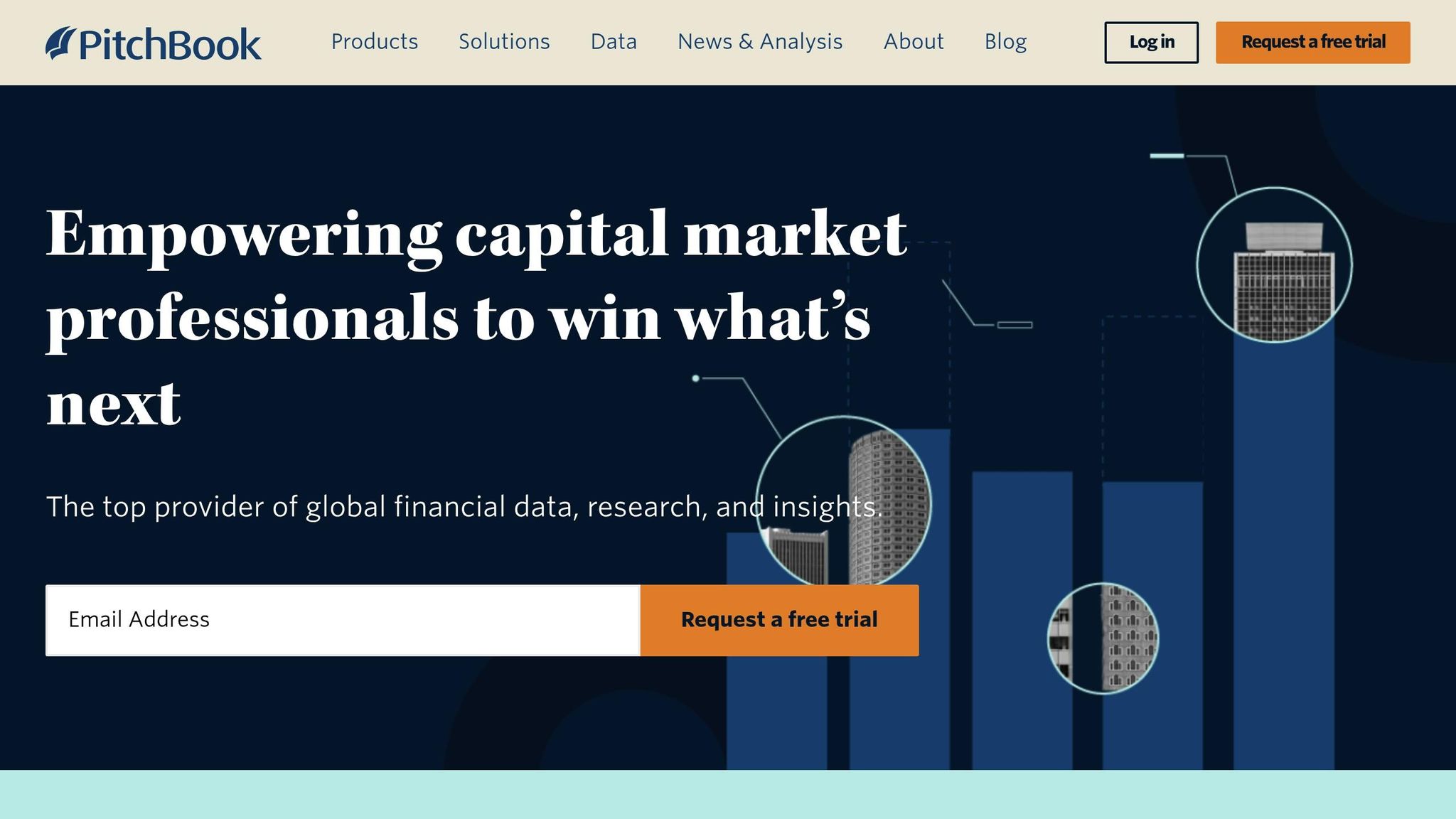
PitchBook steps up from Crunchbase Pro's investor search tools by offering advanced AI-powered analytics. It's designed to help founders make informed funding decisions by analyzing investor behavior and trends.
Here’s what PitchBook brings to the table:
| Feature | What It Does |
|---|---|
| Deal Intelligence | Tracks investment trends and valuations |
| Investor Matching | Identifies investors based on past activity |
| Market Analytics | Provides insights tailored to specific industries |
| Due Diligence Tools | Evaluates company performance metrics |
| Custom Reports | Creates detailed investor landscape overviews |
PitchBook uses AI to analyze historical investment data, helping founders predict trends and find the right investors. For instance, if you’re a Series A healthcare startup in Boston, the platform can pinpoint investors who:
- Specialize in Series A healthcare funding
- Operate in the Northeast
- Offer follow-on investments
- Align with your valuation goals
The platform allows you to filter investors by criteria like investment thesis, location, check size, sector focus, exit performance, and fund stage. It also provides real-time updates and custom alerts to simplify outreach. Additionally, PitchBook generates professional reports covering market sizing, competitor analysis, and growth forecasts - perfect for refining your pitch deck.
sbb-itb-17e8ec9
4. Foundersuite
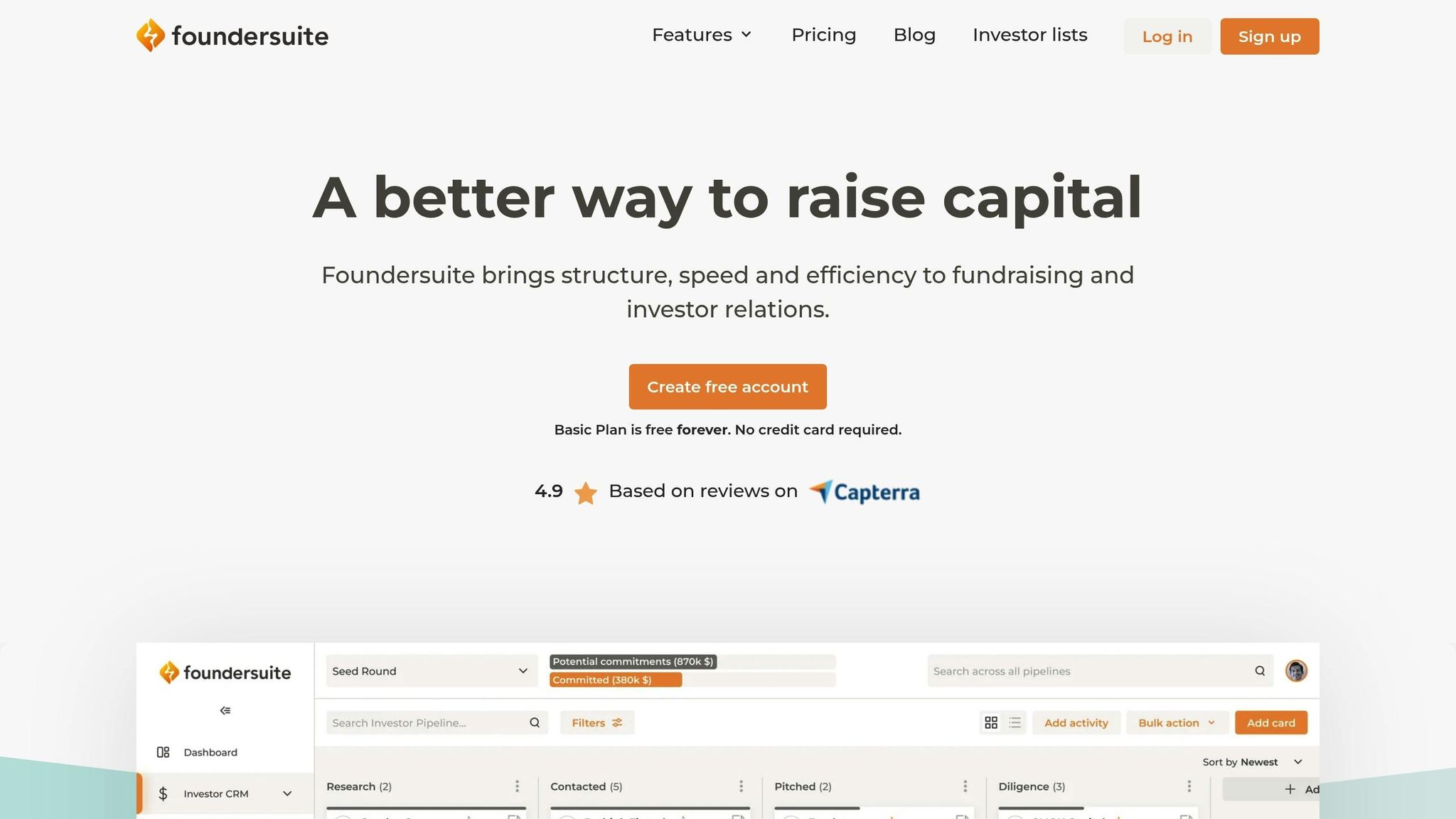
Foundersuite is designed to help manage investor relationships and fundraising campaigns. It simplifies the process of finding investors and tracking interactions with its investor CRM. From initial outreach to follow-ups, the platform keeps everything organized. It also automates investor updates by pulling data from connected systems, saving time and effort.
5. AngelList
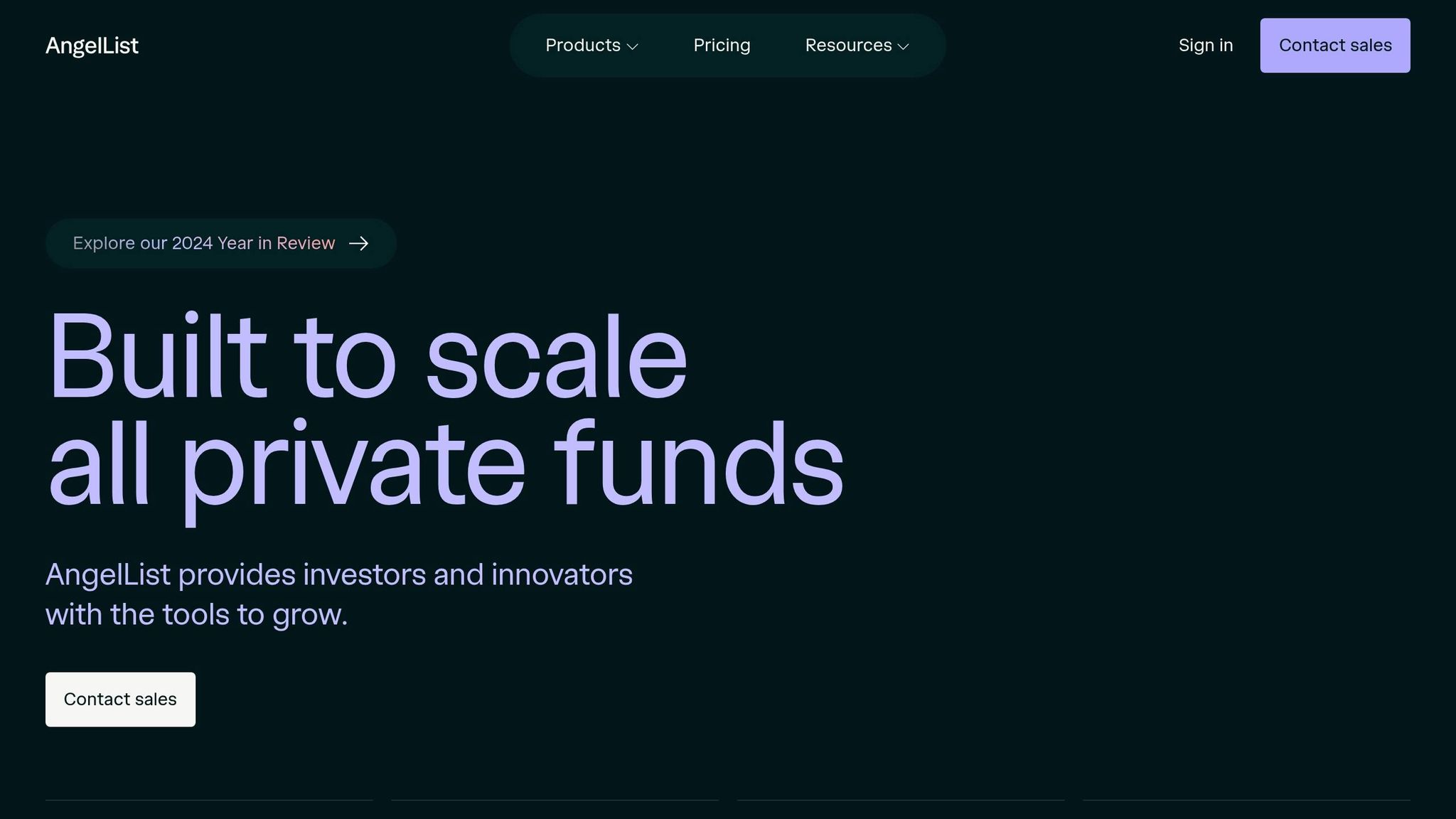
AngelList helps startups connect with investors through advanced, data-driven matching tools. It simplifies the fundraising process by analyzing startup profiles and pairing them with investors who share similar interests and investment patterns.
Here’s what it offers:
- Automated matching: Links startups with investors based on specific criteria.
- Real-time notifications: Keeps founders updated on investor activity.
- Data insights: Offers guidance to help founders better understand the investor landscape.
These tools make it easier for startups to find investors who align with their goals, saving time and effort during the fundraising process.
AngelList’s approach provides an efficient way for startups to tap into the investment world. Up next, learn how Affinity uses network analysis to strengthen investor relationships.
6. Affinity
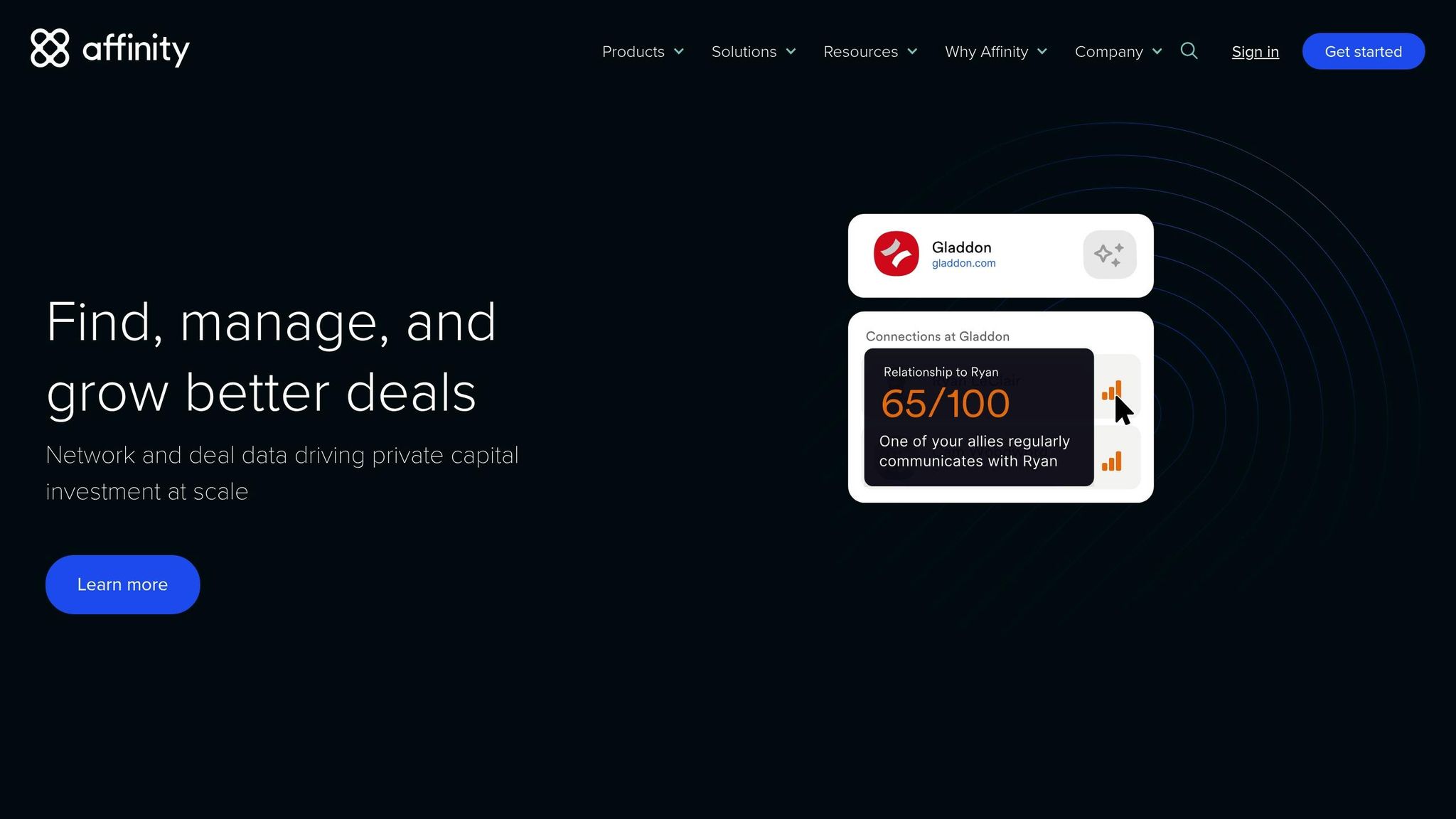
Affinity simplifies managing investor relationships by bringing together essential tools. It integrates seamlessly with email services like Gmail and Outlook, calendar apps, CRM platforms, and deal management software. This creates a centralized hub for all investor interactions. Up next, learn how DocSend helps secure and monitor investor engagement with pitch materials.
7. DocSend
DocSend takes pitch deck sharing to the next level with AI-driven analytics and security tools that track investor engagement in real-time. It gives you a clear view of how investors interact with your materials and helps you make data-driven decisions.
The Smart Analytics feature breaks down investor behavior, showing you exactly which parts of your deck grab attention and where interest fades. Key metrics include:
- Time spent on each slide
- Scroll depth and viewing patterns
- Engagement scores by section
- Viewer location and device details
On top of its analytics, DocSend gives you full control over your pitch materials. With the Access Control system, you can set custom permissions, expiration dates, and even revoke access instantly. This means you can update documents without needing to resend links, keeping your financial information secure and up-to-date.
The platform's AI Engagement Insights helps fine-tune your deck by identifying:
- Sections that resonate most with investors
- Spots where viewers tend to lose interest
- Ideal deck length for your industry
- Content elements that drive the best results
With Smart Notifications, you’ll know the moment an investor views your materials, allowing you to follow up while the opportunity is fresh. Plus, DocSend integrates seamlessly with email and calendar tools, making communication effortless.
For added security, DocSend includes features like watermarking, download restrictions, and detailed access logs, ensuring your content stays protected.
The user-friendly interface keeps everything organized, letting you manage multiple pitch versions within a single investor portal while delivering actionable insights to refine your approach.
Next Steps
Choose AI investor discovery tools that align with your startup's stage and specific needs. Here's a straightforward framework to guide you:
Understand Your Startup's Current Stage
First, identify what your startup needs right now. Early-stage startups often look for tools that help with financial planning and creating pitch decks. On the other hand, growth-stage companies typically require advanced tools for managing investor relationships and tracking performance.
Check Integration Capabilities
For these tools to work effectively, they must integrate smoothly with your existing systems. Look for platforms that can:
- Connect with your accounting software
- Sync with payroll systems
- Provide real-time updates from your bank
- Work seamlessly with your CRM
Focus on Key Features
Outline the features you need based on your goals. Here's a quick comparison:
| Feature Category | Early Stage | Growth Stage |
|---|---|---|
| Financial Planning | Quick scenario modeling | Detailed forecasting |
| Investor Materials | Basic pitch deck insights | Advanced engagement tracking |
| Performance Metrics | Burn rate tracking | Industry benchmarking |
| Communication Tools | Email integration | Access to an investor portal |
Set a Practical Budget
Be smart about your spending. Consider these factors:
- Monthly subscription fees
- Costs for setup and implementation
- Training expenses for your team
- The expected return on investment (ROI) timeline
Roll Out in Phases
Instead of jumping in all at once, take a step-by-step approach:
- Begin with essential tools for financial planning and modeling.
- Add features for finding and reaching out to investors.
- Introduce advanced analytics and tracking tools.
- Expand to a complete investor relationship management platform.
Track Tool Performance
Measure how well the tools are working by looking at:
- Time saved on financial planning and reporting
- Quality and relevance of investor matches
- Response rates from potential investors
- Engagement with your pitch materials
This framework can help you make informed decisions and get the most out of your chosen tools.


